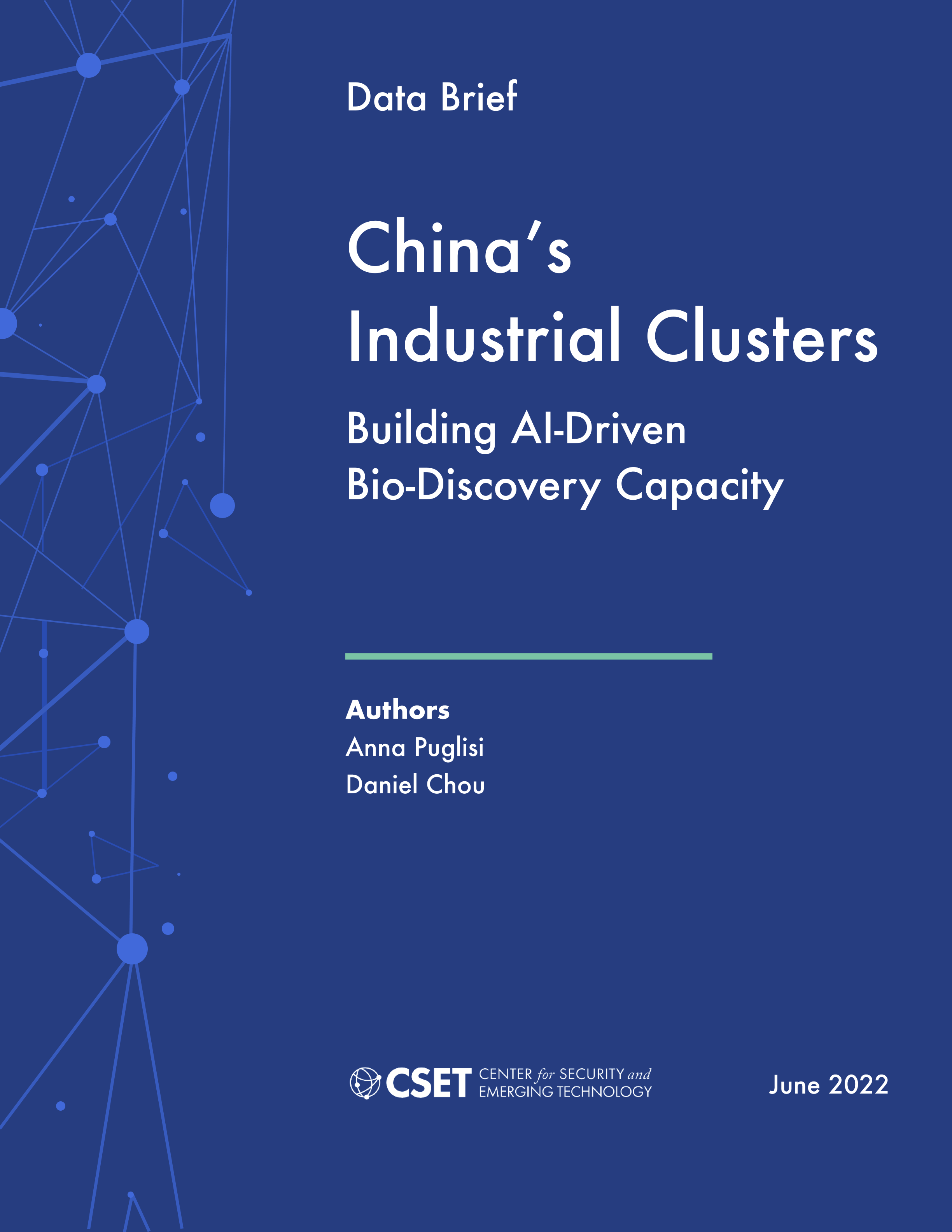Executive Summary
China has a robust research effort to merge human and artificial intelligence to realize a first-mover advantage in AI competition. However, what is often overlooked is the importance of AI to the biological sciences (bio), especially as biological experimentation produces a growing amount of data. AI is becoming a key enabler to modern biological research, helping scientists design more effective experiments, analyze their data, and use it to create groundbreaking therapeutics and materials. This work will impact fields as different as biomedicine, agriculture, energy, and materials.
As a way to foster development and capture the benefits of these new applications, the Chinese government at the central, provincial, and local level has put in place policies to support biotechnology and its bioeconomy, intended to foster “Big Science” facilities, national “champions” (i.e., favored companies), talent recruitment, and basic research. A new aspect of this effort is the creation of “industrial clusters,” as a way to “accelerate the pace of innovation and development in the biotechnology industry,” which China views as a “Strategic Emerging Industry.”1
This issue brief explores the efforts China has made to co-locate key AI and biotechnology facilities into “industrial clusters” to incentivize multi-disciplinary research. We examine the physical locations of the different AI and biotechnology clusters and compare that with publication outputs in Chinese language publications. Key findings include:
- Chinese policies have co-located AI and biotechnology researchers, with the goal of fostering bio research using AI.
- The Chinese government has established 17 biomedical clusters—still in their nascent stages—located in Beijing (2), Chengdu, Chongqing, Guangzhou, Hangzhou, Harbin, Linyi, Shanghai, Shijiazhuang, Suzhou, Tianjin, Tonghua, Wuhan, Xiamen, Yantai, and Zhuhai to foster biological research. They are also home to key research entities and companies that use AI in biodiscovery.2
- In addition to evidence of co-location, we have seen evidence of a growing number of papers that combine bio and AI.
- Given the broad commercial, ethical, and national security implications of these technologies, the country that leads and or dominates in these technologies will obtain distinct advantages.
The United States and its partners should forge a common agenda for the development and governance of both AI use in biotechnologies, as well as the use of genomic data.
Download Full Report
China’s Industrial Clusters: Building AI-Driven Bio-Discovery Capacity- China has designated several fields as “Strategic Emerging Industries” (战略性新兴产业, SEI), to foster a more entrepreneurial environment and grow indigenous companies. The effort began at the top, spearheaded in 2009 by Wen Jiabao and the State Council, and included preferential tax treatment, subsidies and government procurement initiatives. AI and biotech are both considered to be SEIs and factor heavily into China’s efforts; Outline of the People’s Republic of China 14th Five-Year Plan for National Economic and Social Development and Long-Range Objectives for 2035” [中华人民共和国国民经济和社会发展第十四个五年规划和2035年远景目标纲要], original CSET translation (Center for Security and Emerging Technology, May 13, 2021), https://cset.georgetown.edu/publication/china-14th-five-year-plan/; Office of the PRC State Council, “温家宝主持召开三次新兴战略性产业发展座谈会” (Wen Jiabao Hosted Three Emerging Strategic Industry Development Symposiums), September 22, 2009; PRC State Council, 国务院关于加快培育和发展战略性新兴产业的决定 (State Council Decision on Accelerating the Cultivation and Development of Strategic Emerging Industries), SC 32, 2010; PRC National Development and Reform Commission (中华人民共和国国家发展和改革委员会), “关于扩大战略性新兴产业投资培养壮大新增长点增长极的指导意见” (Guiding Opinions on Expanding Investment in Strategic Emerging Industries, and Cultivating New Growth Points and Poles), NDRC 1409, 2020.
- PRC National Development and Reform Commission (中华人民共和国国家发展和改革委员会), 加快推进战略性新兴产业产业集群建设有关工作通知 (Notice on accelerating the construction of industrial clusters in strategic emerging industries), NDRC 1473, 2019.
